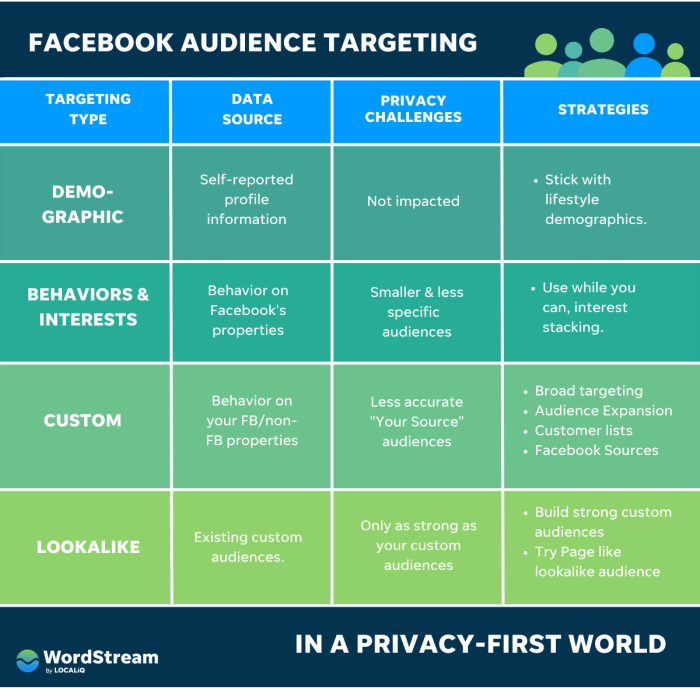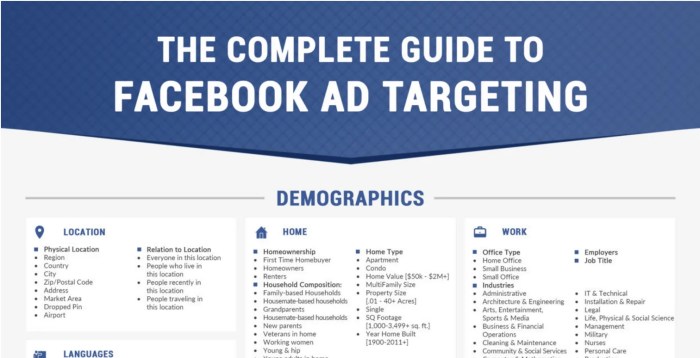Following controversy facebook changes some targeting options for ads – Following controversy, Facebook changes some targeting options for ads. The social media giant’s recent adjustments to ad targeting have sent ripples through the advertising world, leaving marketers scrambling to adapt. This wasn’t just a minor tweak; Facebook cited privacy concerns as the primary driver behind these changes, significantly altering how businesses reach their target audiences. The impact is far-reaching, affecting everything from campaign budgets to the very effectiveness of online advertising.
This shift impacts advertisers reliant on precise targeting, particularly small businesses with limited resources. Industries heavily reliant on Facebook ads, like e-commerce and direct-to-consumer brands, face the most significant challenges. The question remains: can advertisers effectively navigate these changes, or will the altered landscape fundamentally change the game?
Future of Facebook Advertising: Following Controversy Facebook Changes Some Targeting Options For Ads
Facebook’s recent adjustments to ad targeting options, while initially met with controversy, are ultimately forcing a recalibration of advertising strategies. This isn’t the first time the platform has faced scrutiny over its advertising practices, and understanding the historical context is crucial to predicting its future. The changes signal a shift, pushing advertisers to refine their approaches and prompting Facebook to innovate its targeting capabilities.
The long-term effects of these targeting limitations on Facebook’s advertising revenue are complex and multifaceted. While some advertisers might initially experience decreased returns, the overall impact remains uncertain. Reduced micro-targeting could lead to less effective ad campaigns for niche businesses, potentially impacting their spending. However, it also presents an opportunity for Facebook to improve its broader targeting algorithms, potentially attracting a wider range of advertisers who might have previously struggled with the precision (or perceived invasiveness) of highly granular targeting. The ultimate success will depend on Facebook’s ability to balance user privacy concerns with the need to maintain a robust advertising ecosystem.
Potential New Targeting Methods
Facebook is likely to invest heavily in developing alternative targeting methods that respect user privacy while maintaining ad relevance. This might involve a greater emphasis on contextual advertising, where ads are shown based on the content a user is viewing, rather than their personal data. We could also see advancements in interest-based targeting that utilizes aggregated and anonymized data, ensuring user privacy while still providing advertisers with valuable insights. The development of more sophisticated machine learning models could also enable more accurate predictions of user behavior, leading to improved ad targeting without relying on highly specific personal information. For example, instead of targeting users based on their stated political affiliations, Facebook might target based on their engagement with political content, inferring their leanings without directly accessing private data. This approach mirrors how Google utilizes contextual advertising across its various platforms.
Comparison to Past Controversies
This situation echoes past controversies surrounding Facebook’s advertising practices, particularly those related to data privacy and the Cambridge Analytica scandal. These events highlighted the ethical implications of highly personalized advertising and the potential for misuse of user data. The current changes represent a response to these concerns, a move towards greater transparency and a recognition of the need to balance targeted advertising with user privacy. However, unlike previous controversies that largely centered on data breaches, this shift is more proactive, aiming to preemptively address privacy concerns before they escalate into major scandals. The key difference is a shift from reactive damage control to proactive regulatory compliance and user trust building.
Potential Future Scenarios for Facebook Advertising
The future of Facebook advertising hinges on several key factors. Before outlining the potential scenarios, it’s important to remember that these are projections, not guarantees. The interplay between technological advancements, regulatory changes, and user expectations will significantly shape the landscape.
- Scenario 1: A Shift Towards Contextual and Interest-Based Advertising: Facebook successfully transitions to a model that prioritizes contextual and interest-based advertising, maintaining a strong advertising revenue stream while prioritizing user privacy. This could involve partnerships with third-party data providers who adhere to stricter privacy regulations.
- Scenario 2: Increased Reliance on First-Party Data: Facebook strengthens its own data collection methods, focusing on user interactions within its ecosystem to build more accurate targeting profiles without relying heavily on third-party data. This scenario requires a delicate balance to avoid alienating users.
- Scenario 3: Reduced Advertising Revenue and Platform Diversification: The limitations on targeting lead to a significant decrease in advertising revenue, forcing Facebook to explore alternative monetization strategies, such as expanding its subscription services or focusing on other revenue streams.
- Scenario 4: Increased Regulatory Scrutiny and Fines: Despite efforts to improve privacy, Facebook faces increased regulatory scrutiny and hefty fines for non-compliance, impacting its profitability and reputation. This scenario underscores the ongoing need for robust data governance and compliance.
Illustrative Example: The Impact on “Cozy Candles,” a Small Business
Let’s imagine “Cozy Candles,” a small, family-run business specializing in handcrafted, soy-based candles. Their success hinges heavily on targeted Facebook advertising. They’ve built a loyal customer base through meticulously crafted ad campaigns focusing on specific demographics – candle enthusiasts, individuals interested in home décor, and those seeking unique gifts. Their previous success relied on Facebook’s granular targeting options, allowing them to reach precisely the right audience with minimal ad spend waste.
The recent changes to Facebook’s ad targeting options directly impact Cozy Candles’ ability to reach their ideal customer. Previously, they could pinpoint users based on detailed interests, behaviors, and even specific shopping habits. Now, with reduced targeting capabilities, their ads might reach a broader, less relevant audience. This means a higher cost per acquisition (CPA), as their ads are shown to people less likely to be interested in purchasing handcrafted candles. They might see a significant drop in conversion rates and a reduced return on their advertising investment (ROI).
Challenges Faced by Cozy Candles in Adapting to the New System
Cozy Candles faces several key challenges. Firstly, they need to redefine their targeting strategy. They’ll have to rely on broader audience targeting and potentially experiment with different ad creatives to compensate for the loss of precision. Secondly, they’ll need to allocate a larger budget to compensate for the decreased efficiency of their campaigns. Reaching the same number of qualified leads will now require a higher ad spend. Finally, they must closely monitor their campaign performance metrics – clicks, impressions, conversions – and adapt their strategy based on real-time data to optimize their results within the new limitations.
Strategies for Cozy Candles to Overcome These Challenges, Following controversy facebook changes some targeting options for ads
To navigate these challenges, Cozy Candles can employ several strategies. They could explore alternative advertising platforms, such as Instagram (owned by Meta, but with slightly different targeting options), Pinterest, or even Google Ads. Diversifying their advertising channels reduces their reliance on any single platform. They can also refine their ad creatives to be more broadly appealing while still maintaining their brand identity. This might involve focusing on universal themes of relaxation, self-care, or creating a sense of community around their candles. Finally, they should invest in building their email list organically through their website and social media interactions. This allows them to directly communicate with their existing and potential customers, bypassing the limitations of Facebook’s altered ad targeting.
Facebook’s altered ad targeting isn’t just a technical adjustment; it’s a seismic shift reflecting evolving privacy concerns and regulatory pressures. While the immediate impact is felt most acutely by advertisers, the long-term consequences will shape the future of online advertising and the relationship between social media platforms, users, and the businesses that rely on them for outreach. The question now is not just how advertisers adapt, but whether this marks a permanent change in the landscape of digital marketing.
 Blockchain Network Berita Teknologi Terbaru
Blockchain Network Berita Teknologi Terbaru

